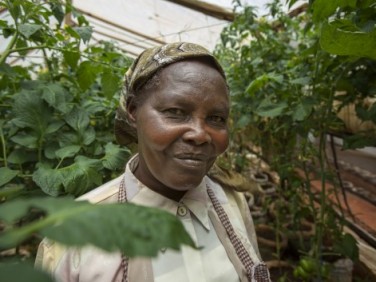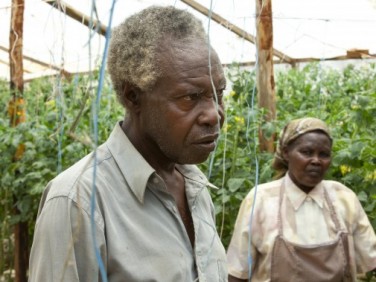
Meet greenhouse farmer Alice Maina
At an age where most people would think of retiring, Alice Maina has started a flourishing small agri-business which will set her and her husband up safely for old age. Thanks to Hand in Hand’s support she now earns KES 20,000 (US $231) a month selling tomatoes and ‘piri piri’ chilli peppers, grown in a greenhouse which she built on her land.
Making ends meet
 Alice lives in a hamlet near Gatundu, in Kiambu county, which despite being only 16 kilometres north of Nairobi is a lush rural area dominated by large commercial farms growing coffee, tea and pineapples. Automation means these farms do not offer much local employment. Instead, most people here are subsistence farmers who just about manage to live off small family-owned plots, which are shrinking in size as the population continues to grow. Alice was a public school teacher – a poorly paid profession in Kenya – when arthritis forced her to retire early. She and her husband were growing vegetables for their own consumption.
Alice lives in a hamlet near Gatundu, in Kiambu county, which despite being only 16 kilometres north of Nairobi is a lush rural area dominated by large commercial farms growing coffee, tea and pineapples. Automation means these farms do not offer much local employment. Instead, most people here are subsistence farmers who just about manage to live off small family-owned plots, which are shrinking in size as the population continues to grow. Alice was a public school teacher – a poorly paid profession in Kenya – when arthritis forced her to retire early. She and her husband were growing vegetables for their own consumption.
Gatundu, Kenya
A bold investment
When Hand in Hand started training her local members’ group, Alice recognized that in order to survive she needed to make her only asset work harder. Alice borrowed money from her local group’s savings fund to buy piri piri chilli seeds, knowing the small peppers fetch a good price on the local market. Her first crop of chillies produced an income of KES 48,000 (US $550) in two months. “I made a good profit because I cut out the middle man and went to the market myself to sell the chillies,” says Alice.
Alice then used KES 15,000 (US $170) of the proceeds and a loan of KES 100,000 (US $1,000) from Kenya’s leading microfinance institution, to whom her Hand in Hand trainer introduced her, to build a small greenhouse.
Thriving on tomatoes
Thanks to the greenhouse, she managed to grow a sizeable crop of beautiful tomatoes. The former teacher has a keen understanding of competition and attributes her commercial success to three things: “Better quality – my greenhouse tomatoes taste better than the normal ones. Good presentation – I always wash them and put them in nice boxes. And last, I’m a good saleswoman – I make sure to talk to all my customers. That’s why I sell more than others.”
“I cut out the middle man and went to the market myself”
Alice feels that the Hand in Hand business training has protected her economic future. “Ten shillings used to buy me flour, sugar, tomatoes and even milk, but now it hardly buys me anything. Life has changed and so I need to change.”
Not content to stand still, she is looking forward to a bigger second crop of tomatoes now. Her Hand in Hand trainer introduced her to a farming expert from the Kenyan Ministry of Agriculture to show her better horticulture techniques.
Sharing success
She is also employing Patrick Kahuni (pictured right), one of her neighbours, to water, fertilise and weed the plants while she goes to the market. Patrick, a father of ten, also farms his own ancestral land but, like Alice, could not make it pay. As a result, Patrick could not afford Kenya’s secondary school fees and four of his chyildren had to drop out of school. Working for Alice has meant that Patrick has managed to put one of his children through secondary education.
a father of ten, also farms his own ancestral land but, like Alice, could not make it pay. As a result, Patrick could not afford Kenya’s secondary school fees and four of his chyildren had to drop out of school. Working for Alice has meant that Patrick has managed to put one of his children through secondary education.
Alice herself is funding her granddaughter’s secondary schooling and is saving up for her own old age.
“I am over 60 now so, God willing, one day I will not have to work anymore. I want to save today, for tomorrow. I want to work hard then retire.”
Alice’s results
Monthly income of KES 20,000 (US $231)
Funds granddaughter’s schooling
Employs neighbour with a family of 10
Next case study: Meet Gloria, the former refugee growing crops – and profits
